VW EPC Light Car Shaking: Causes & Fixes
For many Volkswagen drivers, encountering the vw epc light car shaking can be both perplexing and concerning. The EPC (Electronic Power Control) light is a signal from your VW’s onboard system that something is amiss—potentially serious. Whether it indicates a minor sensor malfunction or a critical engine problem, comprehension of the issue and swift action are imperative.
An illuminated EPC light may correlate with various malfunctions ranging from traction control, throttle position, to issues with the cruise control or ABS control unit. A vw epc light reset could be a temporary fix but diving into the underlying problem is essential. Left unattended, these warning signs can lead to sluggish performance, loss of power, or even trigger the vehicle into a “limp-home” mode to protect the engine. Let’s delve into the origins of this alarming scenario and explore effective solutions.
It’s worth noting that while encountering vw epc light problems, one should not overlook this as a mere inconvenience. The light’s activation could compromise essential safety features like the electronic stability control, demanding immediate attention.
Key Takeaways
- Understanding the EPC light’s role is crucial for maintaining your vehicle’s health and safety.
- A reset may provide temporary relief, but identifying the root cause is essential.
- EPC related problems could impact the vehicle’s traction and electronic stability systems.
- Addressing the issue promptly can prevent the car from entering “limp-home” mode.
- The consistency and performance of your Volkswagen rely on tackling EPC light issues immediately upon detection.
Understanding VW EPC Light and Its Functions
When the EPC light on VW vehicles (Electronic Power Control) activates, it is a crucial alert that indicates your car needs immediate attention. This warning light is an essential component of the engine management system, informing the driver of potential electronics or engine malfunctions that could jeopardize vehicle safety and performance.
An effectively functioning electronic power control VW system is vital for the seamless operation of several vehicular functions, such as the throttle mechanism, brake system, and power steering. The symbiotic relationship between the EPC system and the car’s Engine Control Unit (ECU) ensures constant monitoring and regulation of these crucial aspects of your vehicle’s performance. When anomalies arise, the EPC light illuminates as a signal for the driver to investigate further.
In some cases, the illumination of the EPC light VW corresponds with the ‘check engine’ light. It potentially results in the reduction of the vehicle’s power or initiates a ‘limp-home’ mode to protect the engine from damage, allowing drivers to navigate to a service station safely. Understanding the variety of issues that could trigger the EPC light is key to troubleshooting and ensuring your VW continues to run smoothly.
- Throttle Body Issues: Inconsistent engine response or rough idling could be indicative of a problem with the throttle body.
- Brake System Malfunctions: A malfunctioning brake pedal sensor may trigger the EPC light.
- Power Steering Problems: Difficulty steering or unusual noises while turning can signal a problem in the power steering system that may cause EPC light activation.
Timely diagnosis is crucial when addressing an EPC warning. Standard diagnostic tools, such as OBDII scanners, play an instrumental role in pinpointing the issue, advising on the potential solutions, and preventing possible escalation of the malfunction.
Armed with this knowledge, VW owners can confidently navigate the complexities of the Electronic Power Control system and ensure their vehicle remains an exemplar of German engineering reliability and performance.
Common Triggers of VW EPC Light Car Shaking
Experiencing car shaking or stuttering can be confusing and alarming for VW owners, especially when the Electronic Power Control (EPC) light illuminates. Understanding the common triggers associated with these symptoms is vital for quick and effective troubleshooting. The most frequently encountered culprits range from throttle system irregularities to engine mount issues, each causing distinct signs of distress within your Volkswagen.
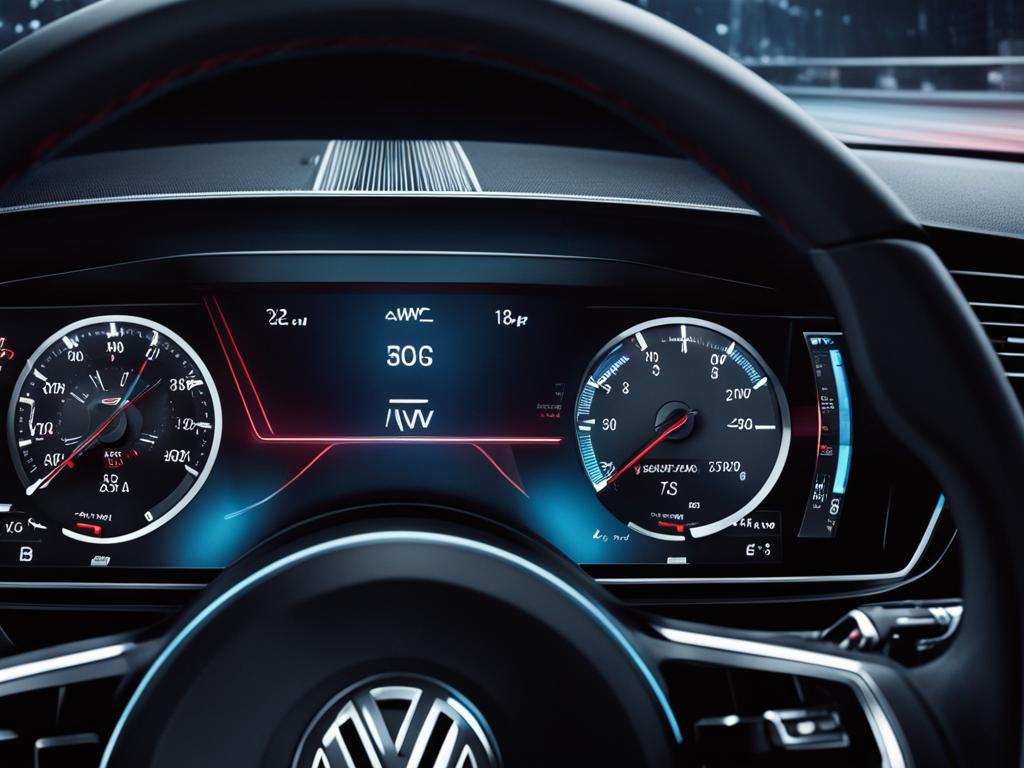
Symptoms of a Faulty Throttle System
A faulty throttle system is a primary suspect behind vw epc light acceleration issues and vehicle shaking. The EPC light can herald a host of throttle system glitches that may lead to a loss of acceleration and engine power. Identifying a compromised vw epc light throttle system often involves noticing a lack of response from your vehicle when you press the gas pedal or experiencing unexpected stutters.
Implications of a Compromised Ignition Coil
Should your VW begin to shake alongside a flashing EPC light, it might indicate an electronic power control malfunction caused by a failed ignition coil. This issue is known to prompt vw epc light engine misfire, typically resulting in inconsistent engine performance and, ultimately, engine shaking vw. Prompt replacement of a faulty coil is crucial to restore normal operation.
Malfunctioning Fuel Injectors and Their Effects
EPC light activation might also be attributed to malfunctioning fuel injectors. Dirty or clogged injectors impair proper fuel flow, which can lead to fuel injectors malfunction vw, resulting not only in reduced performance but also causing the engine to stutter or shake. Advanced scanners can diagnose these issues, which often call for injector replacement to regain stability.
Importance of Engine Mount Stability
The overall harmonic balance of the VW is affected by engine mount stability. Weak or broken mounts can instigate substantial engine vibrations that manifest as shaking throughout the car, particularly pronounced when idling or accelerating. The importance of a stable engine mount system cannot be overstated in preventing epc light car shaking episodes.
VW EPC Light Illumination and Engine Misfire
Experiencing an engine misfire in your Volkswagen can be alarming, especially when it is accompanied by the illumination of the EPC light. This technical symptom often suggests vw engine problems, with specific reference to the term “vw epc light misfire.” Misfires can lead to rough idling, lack of power, and a stark impediment to your vehicle’s performance. Below, we explore common causes and recommended actions.
- Bad Spark Plugs: They are vital for proper engine combustion; misfires often result from worn-out spark plugs.
- Defective Coil Packs: Coil packs failing is another major culprit for misfires.
- Performance Modifications: Modified vehicles with upgrades like a stage 2 tuning can also be more susceptible to misfiring.
If misfires are detected, quickly addressing the issue is key to preventing further damage. The table below summarizes the potential defects and the advised solutions to tackle vw epc light misfire and engine performance issues:
| Issue | Typical Symptom | Advised Solution |
|---|---|---|
| Spark Plugs | Engine stuttering, loss of power | Inspection and replacement |
| Coil Packs | Irregular engine power, engine shaking | Diagnostic scan and replacement |
| Performance Mods | Increased sensitivity to component failure | Meticulous maintenance and component checks |
When a vw epc light misfire is diagnosed, it is usually within the framework of comprehensive engine care. Continued vigilance in monitoring and servicing your Volkswagen’s engine will help avoid these unpleasant disruptions to your drive. For specialized assistance, always seek the expertise of a certified Volkswagen technician.
Identifying Brake System Issues in Shaking VWs
When your Volkswagen begins to exhibit signs of shaking, especially during moments of acceleration or deceleration, it’s often an indication of an underlying issue with the vehicle’s brake system. Problems such as vw brake system problems, imbalanced rotors, brake pad wear, and caliper issues vw, all contribute to what may be described as brake high-speed shaking. Insightful diagnosis and consistent maintenance are key to resolving these issues and restoring your VW to prime condition.
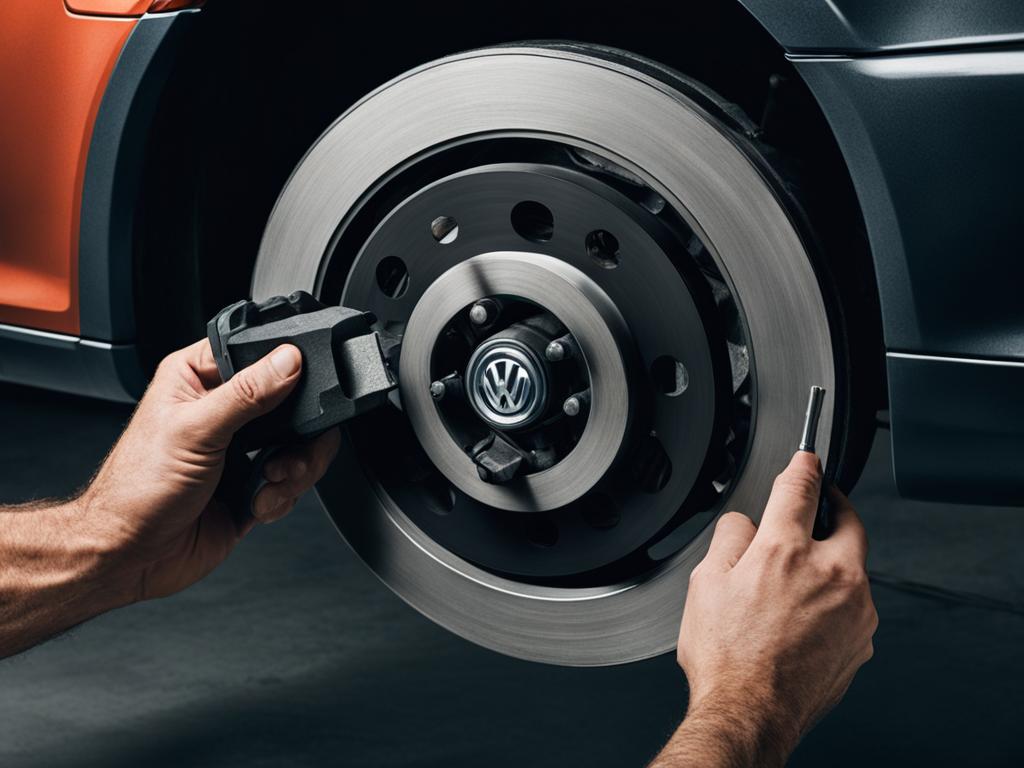
Diagnosing Imbalanced Rotors and Pads
Imbalances in the braking system are common culprits for vibrations that cause drivers discomfort and concern. Rotors that are no longer uniform in thickness due to wear or warping create an uneven braking surface that can lead to vibrations felt through the steering wheel or the vehicle’s chassis. Similar sensations can be attributed to brake pad wear, with the pad material thinning unevenly over time. Rotors and pads should be examined regularly to prevent these imbalances from affecting your driving experience.
Brake Calipers and High-Speed Vibrations
As you reach higher speeds, any issues with the brake calipers become more apparent, often manifesting as a shaking sensation that can rattle the confidence of any driver. Caliper issues vw include sticking, corrosion, or seizing, which not only compromise the integrity of the braking process but also the safety of all vehicle occupants. Addressing these issues is vital to prevent more significant damage to your vehicle’s braking system and its overall operability.
| Brake Component Issues | Symptoms | Maintenance Required |
|---|---|---|
| Imbalanced Rotors | Shaking during braking, uneven brake pad wear | Resurfacing or replacing rotors |
| Worn Brake Pads | Reduced stopping power, squealing noise | Replacing brake pads |
| Caliper Issues | Steering wheel vibration at high speeds, pulling to one side during braking | Repairing or replacing calipers |
Addressing Tire Imbalance and Suspension Complications
Drivers of Volkswagen vehicles may notice the sensation of their car shaking, which can often be attributed to tire imbalance or suspension issues. The telltale sign of a tire imbalance VW is steering wheel vibrations that can worsen, affecting the entire vehicle. Such disturbances not only degrade the driving experience but can also lead to the activation of the EPC light, indicating potential engine or electronic system troubles. Here we detail the steps to address these issues to enhance vehicle handling and safety.
- Inspection of tires: Assess tires for uneven wear and damage.
- Air pressure check: Confirm that all tires are at the recommended inflation levels.
- Tire balancing: Ensure that tires are properly balanced for optimal performance.
- Wheel alignment: Adjust the angles of wheels so that they are set to the car manufacturer’s specifications.
- Suspension check: Examine the suspension system for signs of wear or damage, such as faulty shock absorbers or bushings.
Servicing tires and suspension elements plays a crucial role in the maintenance of any Volkswagen, as suspension issues VW can complicate driving dynamics, leading to potential safety risks. Administering proper care to the vehicle’s wheels and suspension will not only curb the car shaking EPC light scenario but also provide a smoother, more controlled drive. The following table gives a comparative look at common tire and suspension services necessary for safeguarding against imbalance and related complications:
| Service | Description | Impact on Vehicle Performance |
|---|---|---|
| Tire Balancing | Adjustment of weight distribution around a tire/wheel assembly | Reduces vibrations, enhances tire life, and improves fuel efficiency |
| Wheel Alignment | Correcting the tire angles according to specifications | Prevents uneven tire wear, improves handling, and reduces steering difficulties |
| Suspension Inspection | A thorough assessment of struts, springs, and shock absorbers | Improves ride comfort, control, and prevents premature tire wear |
Maintaining proper tire balance and a well-functioning suspension system is imperative for any Volkswagen owner looking to maximize their vehicle’s performance. Tackling these issues not only mitigates the car shaking EPC light problem but also significantly improves overall driving safety and longevity of the vehicle.
The Impact of Engine Mount Defects on Vehicle Vibration
Experiencing vehicle shaking could well be a red flag indicating engine mount issues, particularly when the EPC light on a Volkswagen vehicle illuminates. These mounts hold the engine to the body of the car and when they fail, can lead to significant vibrations that affect driving comfort and vehicle handling. Swiftly diagnosing and remedying such issues is essential for maintaining the longevity and safety of the vehicle.
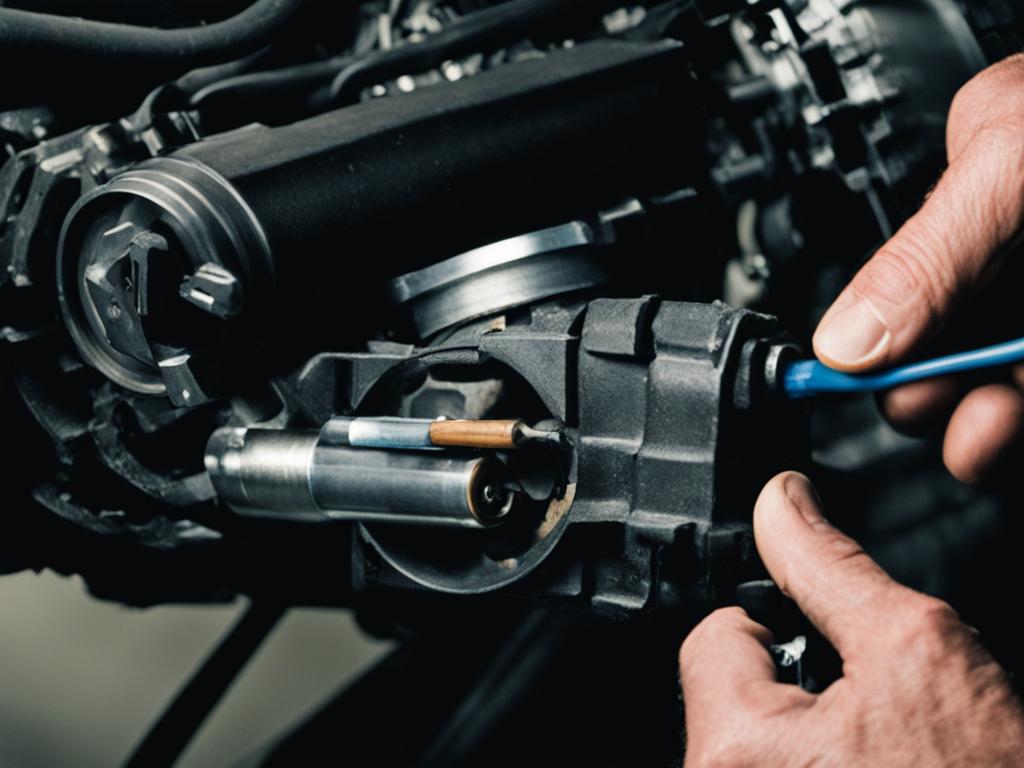
Diagnosing a Damaged Engine Mount
To accurately diagnose engine mount problems, it is crucial to be vigilant for signs of engine displacement or unusual movement, especially when accelerating or making sharp turns. The symptoms of a defective engine mount are often unmistakable, with drivers noticing an abnormal shaking that aligns with engine revs or vehicular movements. These warning signs necessitate a comprehensive evaluation by an automotive specialist, capable of detecting and confirming the root cause of the vehicle shaking EPC VW scenario.
Repair vs. Replacement of Engine Mounts
Once an engine mount defect is identified, the next step is to decide whether to repair or replace the engine mount. This decision hinges on the severity of the mount’s wear or damage. Minor issues might allow for repairs, but in most cases involving significant deterioration, a prompt replacement is advised to ensure that there are no further complications. Below is a breakdown of considerations for both repair and replacement options:
| Issue | Repair Feasibility | Replacement Necessity | Long-Term Outcome |
|---|---|---|---|
| Minor wear | Possible | Not required | May extend mount lifespan |
| Cracks/Splits | Not recommended | Advised | Prevents potential engine damage |
| Broken Mount | Not possible | Essential | Restores vehicle stability |
| Extreme wear | Not viable | Imperative | Eliminates excessive vibration |
In all scenarios, consulting with a qualified technician will provide a well-informed recommendation on whether to repair or replace the engine mount VW vehicles require. Acting upon professional advice will not only address the engine mount issue but also resolve related EPC light warnings, culminating in a smoother, more controlled drive.
Troubleshooting Fuel System Flaws Leading to Shakes and Stutters
When dealing with a VW EPC light no power issue, or when an engine stutter begins to plague your VW’s usual smooth ride, it’s time to dig deeper into fuel system troubleshooting. These symptoms can be not only disconcerting but can also indicate underlying faults that need immediate attention.
Understanding the nuances of your vehicle’s fuel system can be quite the undertaking. However, knowing a few key steps in diagnosing these concerns can save both time and unnecessary expense. The common cause for these distressing signs is often rooted in a fuel supply that’s less than optimal, leading to an underperforming engine, characterized by stutters and loss of power.
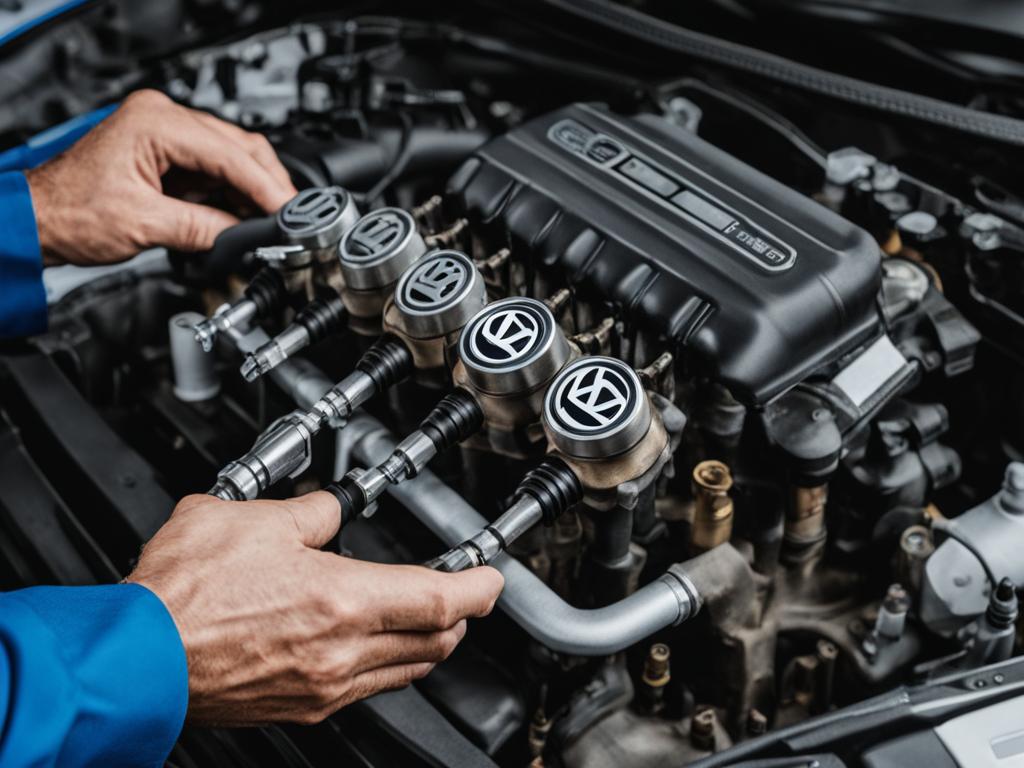
Initiate the diagnostic process by inspecting the most frequent culprits – the fuel injectors and the fuel pump. These components are crucial in delivering the precise amount of fuel to your engine, and any discrepancy in their function can result in noticeable power loss and unsettling shudders.
| Fuel System Component | Symptom | Potential Solution |
|---|---|---|
| Fuel Injectors | Engine stutter and misfires | Cleaning or replacement |
| Fuel Pump | Decreased engine power | Pressure test and replacement |
| Fuel Filters | General poor vehicle performance | Replacement with OEM parts |
| Fuel Pressure Regulator | Inconsistent idling and stalling | Diagnostics and possible replacement |
Notably, the complexity of modern fuel systems necessitates expert intervention. Whether it’s a reduced flow due to a clogged filter or a failing pump, these issues require a professional touch. Engaging with a certified mechanic, especially one with expertise in Volkswagen models, will ensure that your vehicle receives care commensurate with its design and your safety concerns.
Remember, addressing issues related to engine stutter in your VW and the accompanying EPC warning light, is not just about restoring performance, but also about ensuring your vehicle operates safely on the road.
In summary, if your Volkswagen exhibits a loss of power, shakes, or stutters, it is essential to conduct a comprehensive fuel system evaluation. Pinpointing the exact issue and undertaking necessary repairs will restore your engine’s smooth performance, allowing you to enjoy a reliable and efficient driving experience once again.
Dealing with Driveshaft Disruptions and Steering Challenges
Drivers of Volkswagen vehicles may sometimes experience a disconcerting shaking during acceleration. This could point to driveshaft complications or issues within the vehicle’s steering system. Such disruptions not only compromise comfort but can also signify underlying mechanical concerns that need immediate attention. Drivetrain and steering problems are often detectable through distinct symptoms, which, when identified early, can save both time and money, avoiding more extensive repairs down the line.
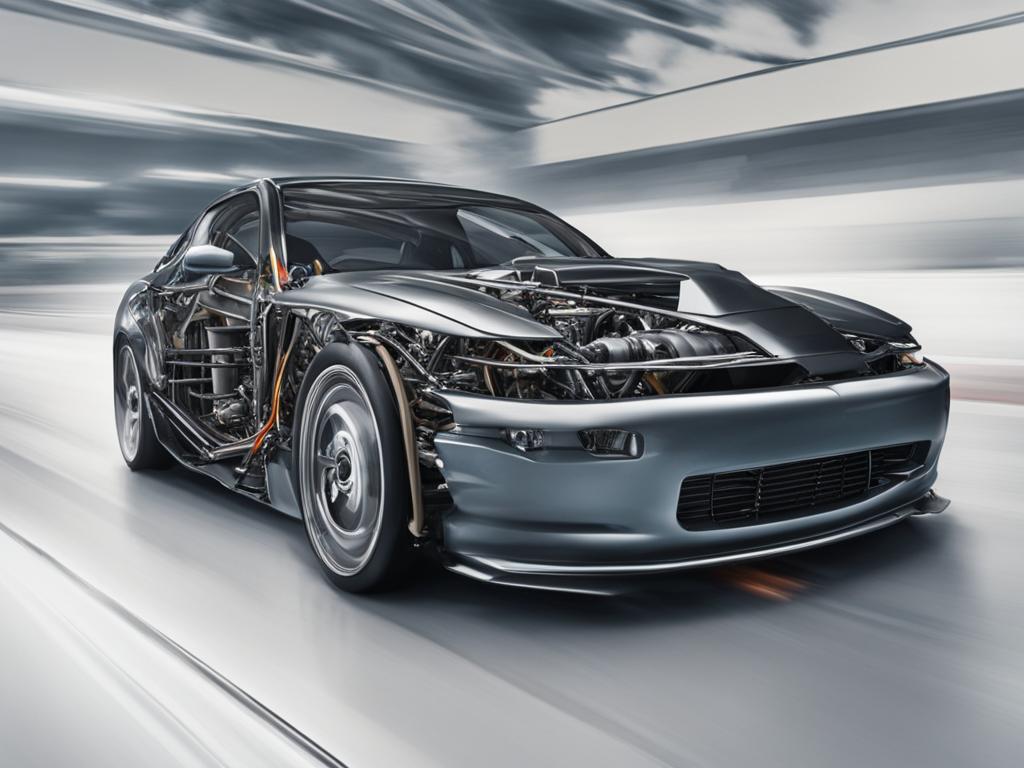
Finding the Source of Drivetrain Vibrations
Drivetrain vibrations are typically most noticeable during acceleration and may trigger the EPC light as a warning sign of driveshaft problems in your VW. It is essential for vehicle owners to recognize early signs of an unbalanced or failing driveshaft to prevent further drivetrain complications. A meticulous inspection conducted at a Volkswagen service center could be the key to uncovering the root cause of drivetrain vibrations and sparing drivers from more severe impacts on vehicle performance.
Common Steering Anomalies Linked to Shaking
Volkswagen owners may also encounter various steering issues VW that can contribute to the car shaking steering problem. Common indicators include difficulty with steering control, unusual noises when turning, or an off-centered steering wheel, which could denote alignment or suspension issues. Pinpointing these anomalies is crucial in maintaining the vehicle’s integrity and the safety of its occupants. Let’s delve into potential causes and solutions for steering-related disturbances:
| Steering Issue | Potential Causes | Suggested Solutions |
|---|---|---|
| Off-Center Steering Wheel | Improper wheel alignment | Wheel realignment service |
| Shaking While Turning | Worn steering components | Inspection and replacement of parts |
| Loose Steering Wheel | Suspension issue | Comprehensive suspension check and repair |
| Difficulty Steering | Power steering fluid leak | Power steering system diagnostics and service |
For Volkswagen owners facing driveshaft problems VW or identifying drivetrain vibrations epc light, timely intervention is pivotal for continued vehicle health. Similarly, steering issues VW can be diverse and disruptive. Grappling with car shaking steering problems requires an expert assessment to ensure the correct diagnosis and application of the appropriate solutions. By addressing the issues highlighted by a shaking steering or resultant drivetrain vibrations, drivers can regain the smooth and reliable performance VW vehicles are renowned for.
Conclusion
In our comprehensive journey to demystify the causes of car shaking and the ominous illumination of the EPC light in Volkswagen vehicles, we’ve delved into a range of potential culprits. From the treacherous ignition coil failures and the clogging mischief of fuel injectors to the sneaky brake system aberrations and the underestimated significance of engine mount integrity, each plays a pivotal role in the well-being of your car. It is imperative for Volkswagen drivers to remain vigilant and responsive to the flicker of the EPC light; whether it decides to glow persistently or blink itself into limp mode. Ignoring such warnings could spiral into more profound mechanical woes, endangering both the vehicle’s performance and occupant safety.
For those who find themselves grappling with the challenge of a stubborn EPC light that refuses to reset or are facing the dreaded limp mode, a methodical approach to troubleshooting is essential. By tackling each plausible cause one by one, not only does one enhance their knowledge as a vehicle owner, but they also elevate their automotive experience with a Volkswagen that runs seamlessly. Should the light stay on, this is a clarion call to seek expert diagnostic services.
Ultimately, the goal is clear – ensure the EPC light serves its noble purpose as a guardian of your car’s intricate electronic systems without overstaying its welcome on the dashboard. With an arsenal of insights on what to do when the EPC light accompanies vehicle shakes, drivers can wield the information to protect their investment and navigate the road with confidence and assurances in their Volkswagen’s capabilities.
FAQ
What causes the VW EPC light to illuminate and the car to shake?
Several issues can cause EPC light activation and car shaking in a VW vehicle, including problems with the throttle system, ignition coil, fuel injectors, brake system, tire balance, suspension, and engine mounts, as well as fuel system flaws, drivetrain disruptions, and steering challenges.
How do I reset the VW EPC light?
A reset of the EPC light typically involves fixing the underlying issue first, whether it’s a throttle recalibration, replacement of faulty sensors, or repairing damaged components. After resolving the cause, the light may reset itself, or it may require a manual reset using an OBD-II scanner or by disconnecting the car battery for a short period.
Can the EPC light indicate issues with the car’s acceleration?
Yes, the EPC light can signal problems with the car’s acceleration due to issues with the throttle system or other related components. It may also trigger limp mode, which limits the vehicle’s power to prevent further damage.
What should I do if my car begins to shake and the EPC light comes on?
If your car starts to shake and the EPC light comes on, you should safely pull over and turn off the engine. It’s advisable to consult the owner’s manual and consider calling roadside assistance or towing your vehicle to a qualified VW technician for a thorough diagnosis and necessary repairs.
Can ignition coil issues cause the VW EPC light to come on?
Yes, ignition coil issues can result in engine misfires, car shaking, and the illumination of the EPC light. It’s important to identify and replace faulty ignition coils to solve these problems.
Are engine mount problems related to the EPC light coming on?
Yes, damaged or broken engine mounts can cause significant vibrations and shaking that may trigger the EPC light. Inspecting and repairing or replacing engine mounts is crucial to resolve this issue.
How do brake system problems link to the EPC light and car shaking?
Brake system problems, such as imbalanced rotors, worn brake pads, or caliper issues, can lead to vibrations and shaking, especially at higher speeds, which may cause the EPC light to illuminate.
What are common indicators of a faulty throttle system in VWs?
Common indicators of a faulty throttle system include a lack of throttle response, reduced acceleration, engine stalling, and a general loss of power, which may be accompanied by the EPC light.
Can fuel injectors malfunction trigger the EPC light in a VW?
Yes, malfunctioning fuel injectors can cause a decrease in engine power, rough idling, and stalling, which may activate the EPC light due to engine performance issues.
If the EPC light stays on, could it mean the car is in limp mode?
Yes, if the EPC light remains on, it could indicate that the vehicle has entered limp mode as a protective measure to prevent further engine or transmission damage.




